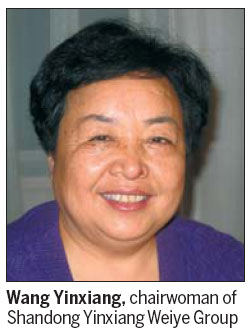Cloning gives birth to lifetime of success in dairy business
Updated: 2012-03-08 08:12
By Xin Dingding (China Daily)
|
||||||||
Farmer-turned entrepreneur Wang Yinxiang came to fame when China's first cloned calf was born on her dairy farm in Caoxian county, East China's Shandong province, in 2002.
Attending the annual session of the National People's Congress as a delegate in Beijing, the chairwoman of Shandong Yinxiang Weiye Group now heads a successful organic milk company that's growing fast in the dairy industry, which faces consumer doubts about safety following a string of quality scandals.
It was far from what she could have imagined when she first started as a village leader who tried to lead fellow villagers out of poverty by producing bricks and growing orchard fruit in the late 1980s.
The fruit was small and tasteless, and it didn't sell well. Technicians were called in to unearth the problem, and that was the first time she heard about organic matter in the soil.
The soil had "lost nutrients because too many chemical fertilizers and pesticides were used in pursuit of higher output. Fruit grown in soil that lacks organic matter can't be good," she said. "We had to improve the soil quality."
The technicians' advice, which she followed, was to buy a few hundred beef cattle, whose manure was used to treat the soil. That was a serendipitous move.

Her cattle herd attracted the attention of Ma Shiyuan, a researcher at the Shandong Academy of Agricultural Sciences. Ma contacted her in 1999, suggesting an experiment at the farm. Ma's idea was to clone cows.
Researchers removed cells from the ears of a prime bull and a high-yield dairy cow, combined the cells with the oocytes of a cow from west Shandong and implanted the cloned embryos into cows.
The researchers hoped that their cloning technologies could be used to control the sexes of calves, increase the number of dairy cows rapidly and thus lead to the production of more milk.
Wang was excited by the idea of "a cow cloning factory". She invested heavily in the experiment, buying bulls and expanding the farm.
In January 2002, China's first cloned calf was born, though it only survived one hour. Subsequently, 11 more cows gave birth to cloned calves, and five survived. One year later, some of those cloned calves began to give birth themselves.
"Though the cloned cows didn't bring as much direct income to the company as expected, my technical staff improved their skills and we built a name that helped attract talent to the company all these years," she said.
Wang, who still does not know how to use a computer, said nonetheless: "I just like to get involved with high-tech stuff."
Her belief in the power of science and technology made a big difference.
After the cloning experiment, she carried out technical cooperation with local research facilities and institutes from Germany, France, Australia, Canada, Israel and Japan.
With professional technical support, the number of dairy cows has grown to 30,000, and milk production is in a healthy cycle. Also, the soil has improved from cow manure and now produces safe feed for the cows, she explained.
She noted that 30 cows "will produce 1 cubic meter of manure each day. Imagine what 30,000 cows can produce".
Part of the manure is given to contract farmers for free to fertilize their farmland, to diminish the use of chemical fertilizers and improve soil quality. In return, farmers grow feed on the improved land and give it to the company to feed the cows.
The rest of the manure is either mixed with straw to grow mushrooms or used to produce marsh gas, which can be burned to generate power.
"We no longer need to compete with others for resources. Everything can be recycled here," she said.
After more than a decade of efforts, the quality of 80,000 mu (2,600 hectares) of farmland has been improved. The soil's organic matter content now meets European Union standards, she said. More than 210,000 farmers who grow feed for the company have seen their incomes rise.
The company also benefits, as its organic milk is sold in more than 100 cities and counties in Shandong and four neighboring provinces. The company now has assets worth 360 million yuan ($57 million).
xindingding@chinadaily.com.cn

 Relief reaches isolated village
Relief reaches isolated village
 Rainfall poses new threats to quake-hit region
Rainfall poses new threats to quake-hit region
 Funerals begin for Boston bombing victims
Funerals begin for Boston bombing victims
 Quake takeaway from China's Air Force
Quake takeaway from China's Air Force
 Obama celebrates young inventors at science fair
Obama celebrates young inventors at science fair
 Earth Day marked around the world
Earth Day marked around the world
 Volunteer team helping students find sense of normalcy
Volunteer team helping students find sense of normalcy
 Ethnic groups quick to join rescue efforts
Ethnic groups quick to join rescue efforts
Most Viewed
Editor's Picks

|

|

|

|

|

|
Today's Top News
Health new priority for quake zone
Xi meets US top military officer
Japan's boats driven out of Diaoyu
China mulls online shopping legislation
Bird flu death toll rises to 22
Putin appoints new ambassador to China
Japanese ships blocked from Diaoyu Islands
Inspired by Guan, more Chinese pick up golf
US Weekly

|

|







